Returning to the Suites Hotel
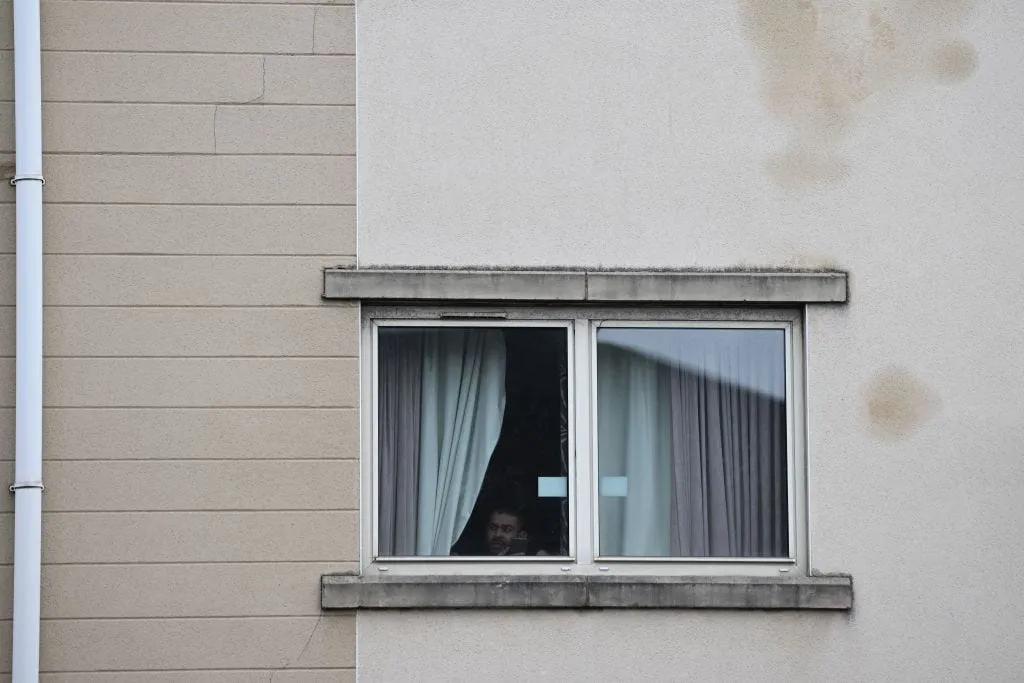
A year ago, a violent mob torched police cars and launched missiles at a hotel housing asylum seekers. This week, we returned…
When Hassan finally left the Suites Hotel in July last year, it marked the closure of one of the strangest chapters of his life.
The Suites was actually the second hotel in the north west that Hassan, who is Iranian, had been placed in. It was also the second to be targeted by protestors. The first venue saw a few angry men gathering at the hotel entrance, demanding to know where he and his fellow residents came from and if there were any women and children were with them, a practice known as ‘hotel monstering’, which has become popular among the far right in recent years. What transpired at the second venue, however, will stick with him for a long time.
On 10 February last year, a large crowd gathered outside the hotel, having heard it was being used to house asylum seekers. Many will remember what came next: a baying mob, several hundred-strong, chanting “GET THEM OUT”; a burnt-out police van; fireworks set off and missiles thrown; and, eventually, a number of arrests.
“I didn’t think it was like this in England,” Hassan says.
In the months after the protest, Hassan’s life became a nightmare. He was afraid to leave his room in the hotel, but had no clarity on how long he would be staying there. Another man who was staying in the hotel at the time reported to The Post that in the following weeks, he and two fellow residents had been attacked while drawing money out of an ATM in the town. They suffered injuries — blood was drawn and the police were called — and the men were shaken up by the attack, though not seriously hurt.
Separately, The Independent reported on a series of hate crimes around Knowsley, including “two men armed with batons on electric bikes” attacking an asylum seeker in a park. The Post was also told that the hotel started receiving racist and threatening phone calls, while Hassan himself describes being shouted at unprovoked by a passing car, the drivers of which made obscene gestures at him. For a series of Fridays after 10 February last year, far sparser crowds gathered by the hotel in a failed attempt to whip up something similar to the chaotic scenes that had played out before.
At the time we felt the analysis that followed the riot was crude. Local politicians lined up to deny the protestors were at all representative of the local population and pinned the events entirely on far-right hooligans. But could 300-plus organised far-right members really have turned out in heavily Labour-voting Knowsley? It seemed pretty fanciful. In reality — whether fuelled by misinformation or otherwise — there was deep unrest in the area that national and local politics had failed to address.
The recent trials of several of the protestors has brought the events back into the news. Nine have been found guilty of various offences, ranging from violent disorder to abusive or threatening behaviour. So one year on, have any lessons actually been learned?
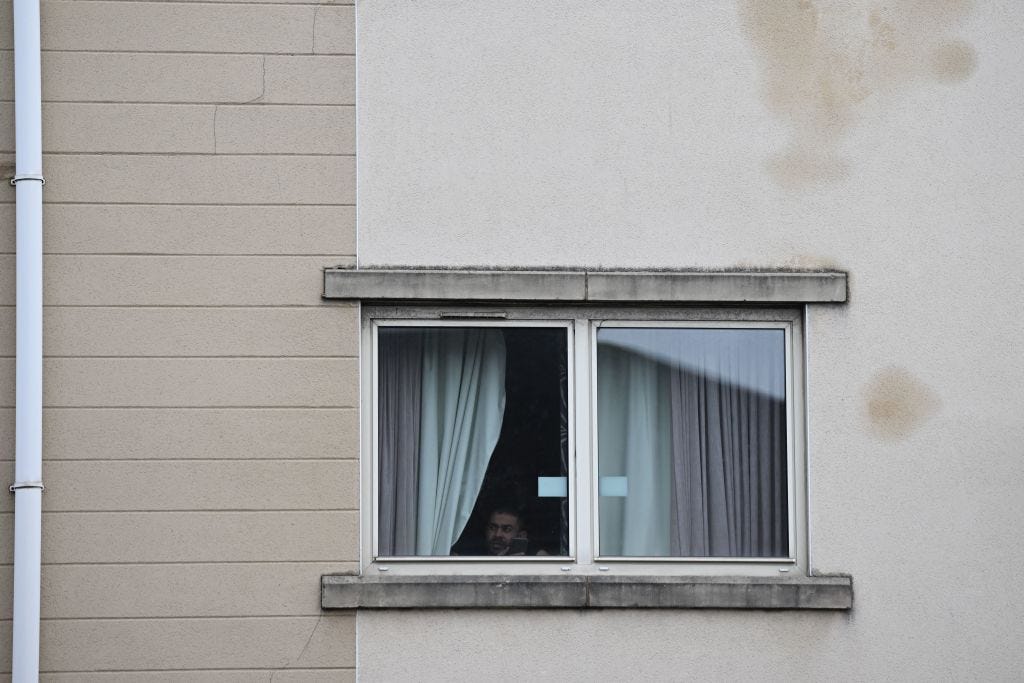
The Guardian’s recent reporting of the trial described how “the far-right group English Defence League (EDL) called a protest outside the Suites Hotel” on 10 February. This framing isn’t necessarily false — but it glosses over a large part of what actually happened. It’s true that at the start of the trial, Martyn Walsh, who led the prosecution, pointed at reports "which stated that members of the English Defence League were going to attend" the hotel. And it’s true, as we reported at the time, that organised far-right groups had a presence in Knowsley before and after the night in question.
Chief among them was James Costello, the self-appointed Pontifex Maximus of the white supremacist Creativity Movement, as well as the neo-Nazi Patriotic Alternative’s main man in the north west. Costello’s claims of a hero's welcome in Knowsley after the riot (he said strangers were stopping him in the street to thank him at the time) seem as inexplicable now as they did then, but his presence was a contributing factor nonetheless. Some of his leaflets — distributed prior to the night — read "5 star hotels for migrants whilst Brits freeze" while others complained that migrants were being given access to the hotel’s swimming pool.
But it wasn’t just Costello and his ilk who turned out. What still seems to be missing from the analysis is a sober reflection on the conditions that led to several hundreds of ordinary people from Knowsley or nearby boroughs to turn up and causing a massive disturbance outside a hotel.
“Why Knowsley though? That’s what I was thinking,” says Mike, a small business owner in Kirkby. He’s standing outside his home, from which the hotel is less than a five-minute walk. He questions whether Knowsley — one of the most deprived boroughs in the country, where almost half of state-funded secondary pupils are eligible for free school meals — is the most sensible choice of location to parachute in hundreds of asylum seekers. “Why does it have to be here? I know things aren’t easy for these people. But it’s not exactly thriving as it is.”
Mike says he didn’t attend the protest a year ago. He didn’t know it was happening, and wouldn’t have gone along even if he did. “I didn’t agree with it at all,” he says. “Not the violence… but the whole situation is a mess”.
According to Ewan Roberts, who works as a centre manager for the asylum seeker charity Asylum Link, the same mistakes that were made at the time are still being made today. Namely, that the hotels housing asylum seekers are still being treated as clandestine facilities, and that local communities remain in the dark as to what is going on. If the government were open about these facilities it might bring about some backlash, he says, but at least an honest conversation could begin. “Hard words are better than petrol bombs,” Roberts says.
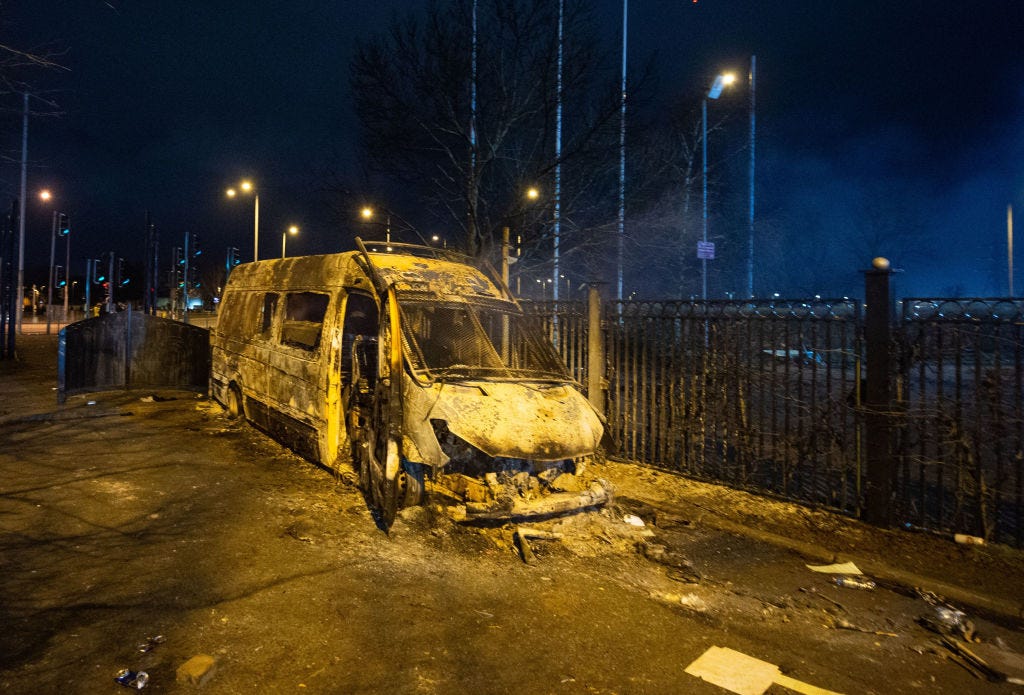
So what efforts have been made to address tensions since the protest? Liverpool City Council asked Asylum Link to produce a short series of videos about refugees who had made it to the UK and set up their lives here. A recent report produced by Knowsley Council gave the Suites events a passing mention, noting it was "committed by a small minority" and "fuelled by online misinformation”. Beyond this, Roberts believes there hasn’t been enough.
For someone with decades of experience working with asylum seekers, Roberts seems almost sympathetic to what drew people to the streets that day. He doesn’t agree with those sentiments, of course, but he understands that the underlying conditions made anger almost inevitable. These conditions haven’t changed. “We’re in a situation where the local infrastructure can’t cope,” Roberts says. “It creates a scenario where local homeless people and the new arrivals are fighting for scarce resources — then that creates community tension and starts the rumours. It’s really hard to stop.”
This is becoming a real problem. The government’s move to accelerate clearing the asylum backlog (meaning temporary facilities like the Suites which hold asylum seekers temporarily won’t be required) is creating a new issue. Roberts’ charity is now dealing with dozens of people being swifty pushed through the system with insufficient housing to support them on the other side. Instead, shop doorways and train station floors await them.
Indeed, Robert’s primary anger is reserved for the government and the secretive manner in which these hotels are used. It’s worth remembering that Knowsley Council were given less than 48 hours’ notice when the Home Office decided they would be housing temporarily to accommodate asylum seekers at the Suites Hotel. There’s not a great deal of community engagement you can achieve in that time. “You have to at least do a bit of work beforehand,” Roberts says. “You can’t sneak people in under the cover of darkness — do it in broad daylight and keep talking to people”.
The instinct in the immediate aftermath last February, to try to pin the blame on a ‘few rogue individuals’ who ‘don’t represent us’ appears to still be the instinct. While there have been no major comparable incidents since last February, Roberts does expect things to start ratcheting back up as a general election draws nearer.
This is his line of work, after all. In Liverpool, Asylum Link have been able to do this quite effectively. They’ve got a choir, they do beach cleans, they are — in his words — “famous in Mold [north Wales] because we've planted so many bloody trees”. They make actual efforts to integrate people into communities, so they aren’t just hidden away behind closed doors.
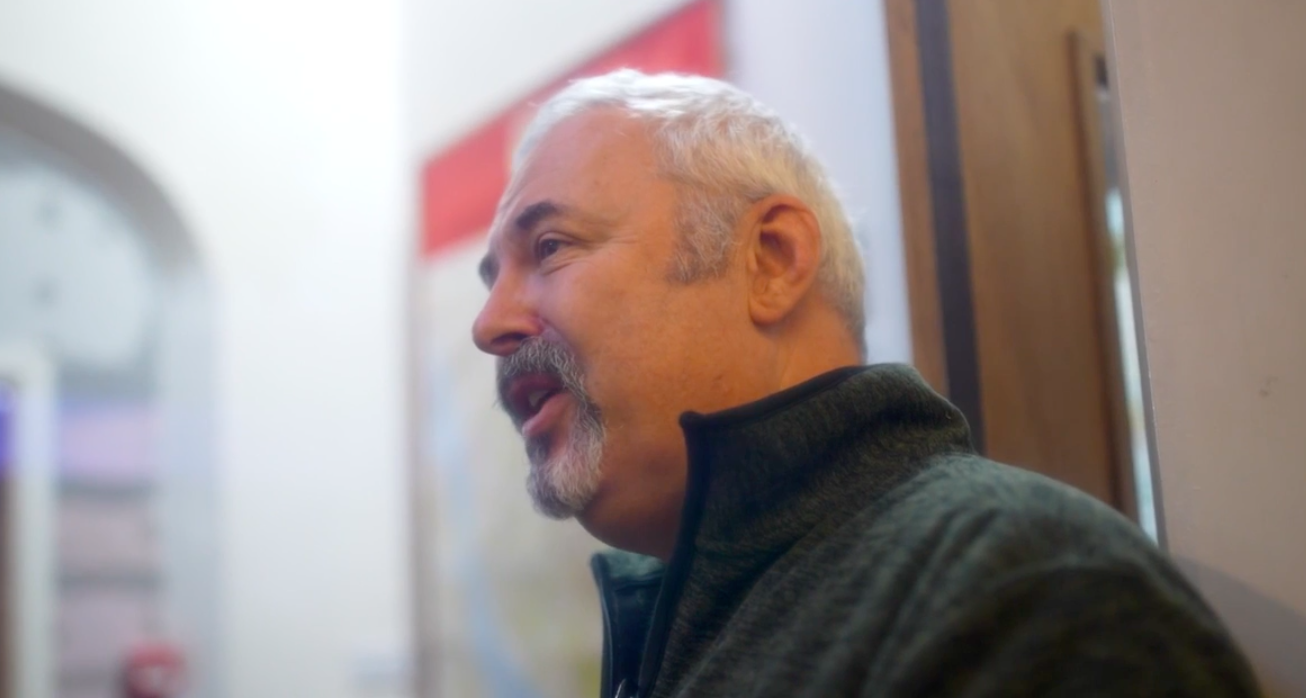
Indeed, while the hotel was due to cease being used for the housing of asylum seekers in January, the government can’t officially confirm this. Roberts likens it to having “a bail hostel or a drug rehab centre” pop up in your town. Unless you explain to people what’s happening, and find a forum to open a conversation about it, the conversations only happen on the fringes; in the corners of pubs or social media forums. These aren’t always conversations that help.
Local resident Suzanne, who has lived in Knowsley her entire life, says that little has been done since last February to address the problems in the town. Nonetheless, she accepts that the protest was the wrong approach. “It went too far. I know a couple of people who went to the hotel and I think they were a bit embarrassed the next day. I don’t think they expected all of that to happen,” she says.
She names another local hotel that she heard was used to house asylum seekers instead of the Suites, and which is apparently still being used for this purpose today. Yet when I investigate this claim, it turns out to be completely untrue. Her confusion reflects how things kicked off in the first place. She refers to the incident that triggered the protest at the time — a video of one of the men who had stayed at Suites (who had actually left by that point) speaking to a 15-year-old girl and allegedly asking her to kiss him. “They could be anyone. We don’t know who they are. We don’t know anything about them,” she says. “That’s what’s frightening.”
At the end of last year, the Home Office announced it would be “returning” 50 asylum seeker hotels to their normal use. But given 2024 has seen record small boat crossings for a January to March period in the UK, Roberts believes something has to give. “They can’t shut the hotels down. They’ve got nowhere to put people,” he says. The controversial plan to use barges to house people instead was one proposed solution to this, with Liverpool firm Bibby Marine accepting a big contract to do so. But parking the massive chorus of outrage from local charities and politicians on the ethical ramifications of this plan (Steve Rotheram told The Post that Bibby were “profiteering by inflicting misery”), last year it was revealed the Bibby Stockholm barge would actually cost more per head than the hotels.
Moreover, it was suggested that the Suites would be shut down immediately after the riot last year. However, The Post understands that at the time the government enacted what is known as a “don’t back down” policy. Had they moved the asylum seekers out of the hotel, as many suggested they ought to, they reasoned it would look as though they were cowering to the mob. “Then other locations would become targets,” says an insider who works in immigration. “If you hit a few police officers then they’ll move everybody out of town”.
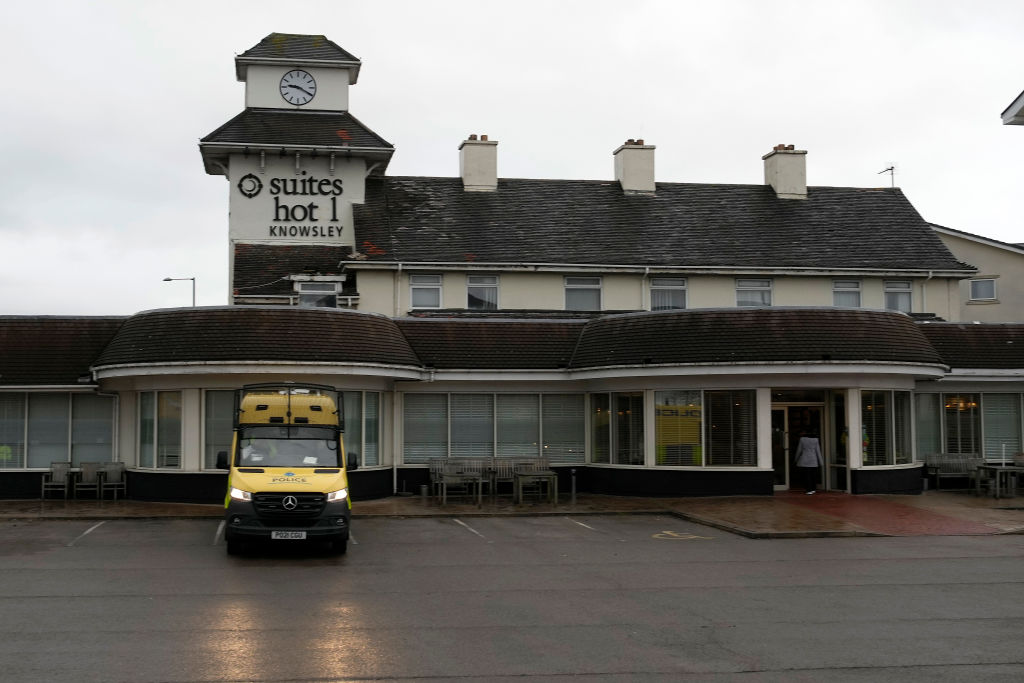
It’s hard to say whether these events carry any kind of legacy. Kai Taylor, the Green Party leader in Knowsley, doesn’t necessarily believe they do. He points to the scale of the public rebuke of the protest, and the fact that at the recent trial none of the accused even attempted to make martyrs of themselves. Rather, they all attempted to distance themselves, painting their actions as that of barely involved onlookers. One of the accused at the trial said he was merely walking his dog when he stumbled upon the protest.
Not a great deal has changed in a year, though. The residents we spoke to shared the same combination of sympathy for the plight facing the town’s newlookers mixed in with unease and a sense of injustice that Knowsley’s already stretched resources are being tested further. Everyone seems just as in the dark now as they were then.
Hassan, meanwhile, has relocated to a town in Greater Manchester. He’s helping other asylum seekers through a small charity and created something of a life for himself in the new surroundings. His English is improving slowly too, he says. He wants it to be made clear that, for the most part, the English people have been very welcoming.
“The English are very kind,” he says. “They have helped me a lot.” The events of 10 February 2023 though, will take a long time to forget.

Comments
Latest
From Hoylake to St Helens, community cinema is making a comeback
Millions of tonnes of greenhouse gas to be piped under Liverpool Bay
The unexpected auction: A London fund manager is selling Merseyside homes from under their tenants
Northern Powerhouse Rail is back on track. We think...
Returning to the Suites Hotel
A year ago, a violent mob torched police cars and launched missiles at a hotel housing asylum seekers. This week, we returned…